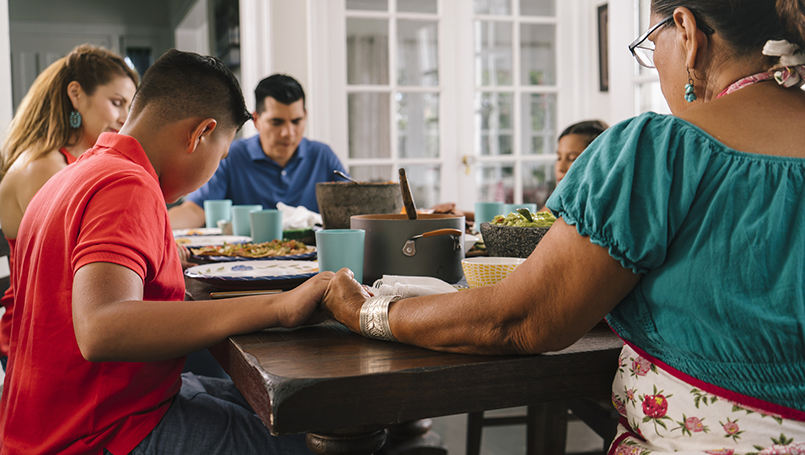Monday, November 13, 2023

We’re fast approaching Thanksgiving, a day specially reserved for counting our blessings and expressing gratitude to our loved ones.
“Cultivating gratitude in difficult times is actually one of the most helpful things we can do to lead to improved feelings of contentment, happiness and joy,” said Brittany Barber Garcia, Ph.D., a pediatric psychologist at Corewell Health Helen DeVos Children’s Hospital.
“Research shows that people who have a daily practice of gratitude, or who even just pay attention to the blessings in their lives, are much more likely to experience greater happiness and well-being,” she added. “In fact, gratitude is consistently and strongly associated with positive emotions, improved health and greater capacity to deal with adversity — things we could all use right now.”
Unfortunately, the human brain can sometimes work against itself with a negativity bias, which we must learn to overcome. Gratitude is one way to achieve this, Dr. Barber Garcia said.
It is important to grieve your losses and validate your feelings, but it’s also easy to get stuck and stay focused on what we have lost, said Lyndsay Volpe-Bertram, Psy.D., a psychologist with Corewell Health Medical Group West.
“Focusing on gratitude, whether it’s noticing what went well for us or who is in our life and what they mean to us, can help to reshape those patterns,” Dr. Volpe-Bertram said. “The more we do that, the more naturally it’s going to come to us.”
Tips for celebrating gratitude this holiday season:
Find the silver linings
This is a phrase Dr. Barber Garcia uses with children, but it works for adults too.
“Many things in our world right now are chaotic, unknown and uncertain,” she said. “Even though those things are going on, that doesn’t mean there’s an absence of good things. It just means we might have to look harder for them.”
The silver linings exist in our lives right alongside the hard things.
“It’s not an either/or, it’s a both/and,” Dr. Barber Garcia said. “We can have a tough day, but we can also find something that brought a smile to our face.”
This applies to holidays, Dr. Volpe-Bertram said.
Stop and notice
When you find the things that bring happiness and joy to your life, stop and recognize them.
“Identify it and hold onto it, even just for a couple of moments,” Dr. Barber Garcia said. “That can make a world of difference.”
Make the choice to be thankful.
“‘Attitude of gratitude’ is a catchphrase for a reason,” she said. “An attitude is more than a feeling or an emotion. It’s a choice. It’s an intentional decision about your perspective.”
Model gratitude for children
“Children, even young children, are very capable of identifying things that they feel grateful for,” Dr. Barber Garcia said. “They also can reap the benefits of this.”
It helps if the adults in their life model it.
“Ask them, ‘What brought a smile to your face today?’” Dr. Barber Garcia said. “You can also tell them what you feel grateful for to model this behavior, and it does not have to be something big. You can say, ‘You brought a smile to my face when we were cuddling together.’ Or ‘I’m grateful you helped your brother just now.’”
“When they hear us say it, that can be a really powerful teaching tool for kids to pick up on how we practice gratitude,” she said.
Write it down
Gratitude journals aren’t just trendy. They’re actually backed by scientific research to show they can make us happier.
“What the research supports is that we have to make it a routine in order for it to be helpful in a longstanding way,” Dr. Volpe-Bertram said.
One way to do that is to write down what you’re thankful for in a journal. There are even smartphone apps for this.
Dr. Volpe-Bertram suggested reflecting on these questions:
- What went well today?
- When did I feel positive?
- When and why did I smile?
- Who did I talk to who I value in my life?
“Identify three good things over the course of your day,” Dr. Volpe-Bertram said. “They can be simple things like, ‘I’m grateful for that first cup of coffee I had in the morning.’ It doesn’t have to be this really ground-shifting thing.”
On especially difficult days, you can look back on all the things you have to celebrate in your life.
Pass it on
When you think about something you’re grateful for, sharing it with someone helps make it even more real.
“As we are sharing our gratitude with other people, not only do we get a positivity spike, there’s the benefit for the other person as well,” Dr. Barber Garcia said.
It can even help heal relationships with your partner, children and friends.
“It helps you to focus on the things they’re doing that you might take for granted, and that helps to build admiration,” she said. “When someone does something nice for you, it helps to think, ‘This might be a good time to tell them thank you for that."
